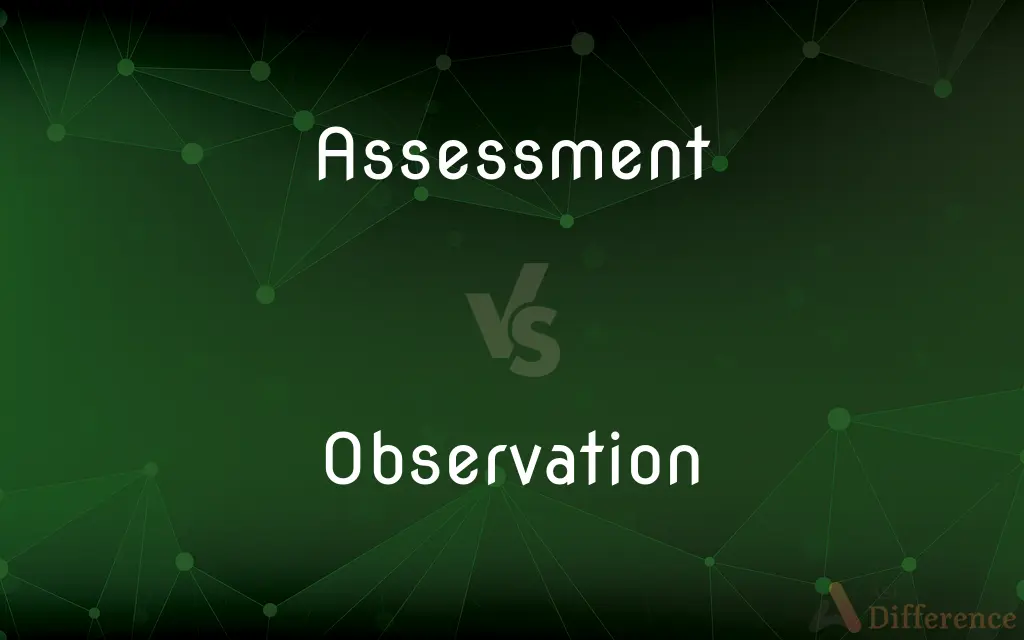Assessment vs. Observation — What's the Difference?
By Tayyaba Rehman & Urooj Arif — Updated on April 27, 2024
Assessment involves systematic evaluation of skills or knowledge, while observation focuses on watching and noting behaviors or phenomena.

Difference Between Assessment and Observation
Table of Contents
ADVERTISEMENT
Key Differences
Assessment is typically structured and aims to measure specific outcomes or competencies, using tools like tests or assignments. Whereas observation is more about unstructured, real-time monitoring of behaviors or events without necessarily measuring against predefined criteria.
In education, assessment is used to grade students and determine their mastery over subjects, while observation might be used to understand student behaviors and interactions in a classroom setting.
Assessments often require responses from the subjects being assessed, whether in written, verbal, or practical form. On the other hand, observations can be conducted without any interaction from the subject, making it more passive.
The results from assessments are quantifiable, providing numerical or categorical data that can be analyzed statistically. In contrast, observations often yield qualitative data that provide insights into patterns and behaviors but may not be as easily quantifiable.
While assessments are usually periodic and planned well in advance, observations can be continuous and require minimal preparation.
ADVERTISEMENT
Comparison Chart
Purpose
To evaluate knowledge or skills
To watch and note behavior or phenomena
Data Type
Quantitative (scores, grades)
Qualitative (notes, recordings)
Interaction with Subject
Requires participation
Can be done without subject’s interaction
Structure
Structured with specific criteria
Unstructured, more flexible
Outcome
Specific outcomes measured (pass/fail, grade)
Descriptive insights without specific measurement
Compare with Definitions
Assessment
A systematic process to evaluate an individual's performance or knowledge.
The final assessment in the course involves a comprehensive written exam.
Observation
The action of observing something carefully to gain information.
The scientist's observation of the birds took place over several months.
Assessment
Often involves collecting and analyzing data to make educational decisions.
Teachers use weekly assessments to determine if students are understanding the material.
Observation
Utilizes the observer's senses, often supported by instruments.
Her observation of the social dynamics in the classroom helped shape the study.
Assessment
Intended to provide measurable results used to guide future teaching or training.
Based on the assessment results, the curriculum was adjusted to address weaknesses.
Observation
Is essential in research to form hypotheses and understand phenomena.
Early observation in the study indicated a trend that warranted further investigation.
Assessment
Can be formative or summative to support learning or to measure competence at the end.
The mid-term assessment gives students feedback on their progress.
Observation
Observation is the active acquisition of information from a primary source. In living beings, observation employs the senses.
Assessment
May include tools like tests, interviews, or performance evaluations.
The job assessment included a practical task to perform.
Observation
The act of observing
Observations of a rare bird.
Assessment
The act of assessing; appraisal.
Observation
The power or faculty of observing.
Assessment
An amount assessed, as for taxation.
Observation
The fact of being observed
Kept the suspect under observation.
Assessment
The act of assessing or an amount (of tax, levy or duty etc) assessed.
Observation
The act or process of perceiving something, such as a phenomenon, often by means of an instrument, and making a record of the resulting information.
Assessment
An appraisal or evaluation.
Observation
The result or record of such an act or process
A meteorological observation.
Assessment
The act of assessing; the act of determining an amount to be paid; as, an assessment of damages, or of taxes; an assessment of the members of a club.
Observation
An inference, judgment, or remark that is made by observing
Made some sharp observations about the movie.
Assessment
A valuation of property or profits of business, for the purpose of taxation; such valuation and an adjudging of the proper sum to be levied on the property; as, an assessment of property or an assessment on property.
Observation
The act of observing, and the fact of being observed (see observance)
Assessment
The specific sum levied or assessed.
Observation
The act of noting and recording some event; or the record of such noting.
Assessment
An apportionment of a subscription for stock into successive installments; also, one of these installments (in England termed a "call").
Observation
A remark or comment.
Assessment
The classification of someone or something with respect to its worth
Observation
A judgement based on observing.
Assessment
An amount determined as payable;
The assessment for repairs outraged the club's membership
Observation
Performance of what is prescribed; adherence in practice; observance.
Assessment
The market value set on assets
Observation
A regime under which a subject is routinely observed.
Assessment
The act of judging or assessing a person or situation or event;
They criticized my judgment of the contestants
Observation
Philosophically as: the phenomenal presence of human being existence.
Observation
(stochastics) A realization of a random variable.
Observation
The act or the faculty of observing or taking notice; the act of seeing, or of fixing the mind upon, anything.
My observation, which very seldom lies.
Observation
The result of an act, or of acts, of observing; view; reflection; conclusion; judgment.
In matters of human prudence, we shall find the greatest advantage in making wise observations on our conduct.
Observation
An expression of an opinion or judgment upon what one has observed; a remark.
To observations which ourselves we makeWe grow more partial for the observer's sake.
Observation
Performance of what is prescribed; adherence in practice; observance.
We are to procure dispensation or leave to omit the observation of it in such circumstances.
Observation
The act of recognizing and noting some fact or occurrence in nature, as an aurora, a corona, or the structure of an animal.
Observation
The act of making and recording a measurement
Observation
The act of observing; taking a patient look
Observation
Facts learned by observing;
He reported his observations to the mayor
Observation
The act of noticing or paying attention;
He escaped the notice of the police
Observation
A remark expressing careful consideration
Observation
Can be either participant or non-participant in nature.
He conducted non-participant observations to ensure his presence did not affect behavior.
Observation
Often documented using detailed notes and recordings.
Observation notes from the sessions are critical for analyzing behavioral patterns.
Common Curiosities
How is observation different from assessment in purpose?
Observation aims to gather information and insights through careful watching, without direct interaction.
What are some common tools used in assessments?
Tests, quizzes, interviews, and performance tasks.
How do observations help in educational settings?
They provide insights into student behavior and classroom dynamics that are not visible through traditional assessments.
Can observations be used as assessments?
Observations can contribute to assessments but are typically not used alone for formal evaluations.
What is the main purpose of an assessment?
To evaluate specific skills or knowledge and measure outcomes.
Can observations be biased?
Yes, observer bias can influence the outcomes, making it subjective.
Are assessments always formal?
Mostly, though informal assessments like class participation can also occur.
How are observations documented?
Through detailed notes, audiovisual recordings, or photographic evidence.
What types of data do observations typically produce?
Qualitative data such as detailed notes, video recordings, or anecdotal records.
What is the difference between formative and summative assessments?
Formative assessments aim to monitor student learning progress, while summative assessments evaluate their learning at the end of an instructional period.
What is non-participant observation?
Observing without interacting with the subjects or influencing the situation.
Share Your Discovery

Previous Comparison
Methi vs. Fenugreek
Next Comparison
Nuts vs. BeansAuthor Spotlight
Written by
Tayyaba RehmanTayyaba Rehman is a distinguished writer, currently serving as a primary contributor to askdifference.com. As a researcher in semantics and etymology, Tayyaba's passion for the complexity of languages and their distinctions has found a perfect home on the platform. Tayyaba delves into the intricacies of language, distinguishing between commonly confused words and phrases, thereby providing clarity for readers worldwide.
Co-written by
Urooj ArifUrooj is a skilled content writer at Ask Difference, known for her exceptional ability to simplify complex topics into engaging and informative content. With a passion for research and a flair for clear, concise writing, she consistently delivers articles that resonate with our diverse audience.












































